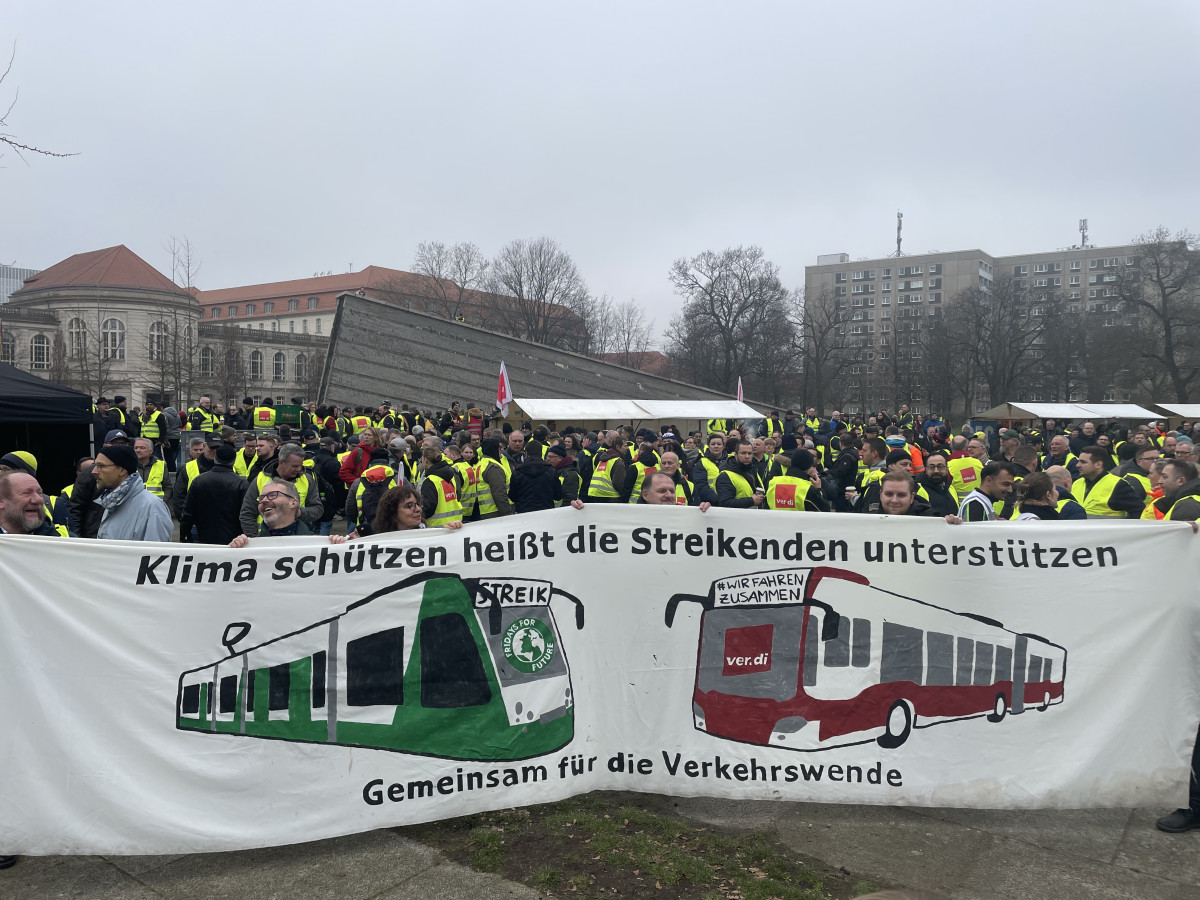Climate protesters in Germany join forces with public transport workers to push for change
An unusual alliance has forced public transport across Germany to grind to a halt for a week of alternating strikes, with a collective nationwide walkout and climate protest as the highlight on 1 March: One of Europe’s largest trade unions, Verdi, which represents the majority of public transport workers in Germany, joined forces with climate protest movement Fridays for Future (FfF) to strike for better working conditions in public transport sector and support its green transition. Under the slogan #WirFahrenZusammen (We’re driving together), transport workers and climate activists in more than 100 cities took to the streets today in almost all of Germany’s states.
Although being first and foremost committed to the interests of its members, the fact that Verdi is now joining forces with a movement that is demanding environmental policy goals seems to be an unlikely match only at first glance, but builds on a common ground.
The strike follows ongoing wage negotiations for the approximately 90,000 employees in local public transport in over 130 municipal transport organisations, in which Verdi demands better working conditions for employees, including shorter working hours without financial losses, longer rest periods between shifts, more holiday days and greater holiday pay. At the same time, FfF activists have called for a climate strike to endorse their demand of billions of euros in additional investments in local transport by 2030 and calling for a “socially just transport sector transition.”
The calculations behind this unusual entanglement are simple: better working conditions for public sector employers are necessary to make public transport jobs more attractive and services more reliable as an alternative to private cars. Local public transport users increasingly feel the effects of the shortage of skilled workers in the sector, suffering from thinned-out timetables and cancelled bus rides – compounded by repeated waves of strikes including at national railway company Deutsche Bahn, which operates long-distance services. According to the Association of German Transport Companies (VDV), 110,000 new employees need to be hired across Germany by 2030 to fulfil climate targets in the transport sector.
Shifting traffic volumes towards public transport remains an important part of decarbonising the mobility sector. As a measure to make public transport more attractive and offset rising energy prices, the government introduced the 9-euro ticket in 2022, which temporarily allowed travel on local and regional public transport across the whole country for the monthly fee. The successor, the 49-euro Deutschland ticket, was implemented earlier in 2023, but was found to have not significantly reduced car use, indicating that other interventions will be needed for Germany’s mobility sector to meet its climate targets.
Focussing solely on fighting the climate crisis for a long time, the FfF movement is increasingly forming alliances to also bring social balance, justice and democracy to the table, calling for demonstrations against right-wing extremism or standing shoulder to shoulder with local transport workers. Linking climate and social struggles is also part of the movement’s new strategy to avoid sliding into insignificance. The challenges of this widened scope of action became apparent for the German branch of FfF in its dispute with Greta Thunberg over the Israel-Palestine conflict in the Middle East. The Swedish founder of the movement had sided with Palestinian protesters demanding a retreat of Israel, a position that was criticised as one-sided and damaging for their cause by leading FfF figures in Germany.
At Friday’s protest in Berlin, the mood was much less tense: more than a thousand protestors gathered at Berlin's Invalidenplatz, just minutes away from the German ministry of transport. "People from every generation are standing here, regardless of whether they work or still go to school. This is an important signal," says an activist on stage. Pop music mixes with whistles, with employees with yellow safety vests standing next to activists with green flags. Lilo and Selma, both school students from Berlin, were in 6th grade when they joined their first climate protests in 2019. "In the meantime, the momentum has gone a bit, as nothing has happened politically." Nevertheless, it is important to them to be here today, adding that to them the alliance with Verdi makes sense. "The union appeals to a broader, working population, which also gives our concerns more weight," says Lilo. It is precisely this generation that should be standing here and campaigning for the climate, not just young people. "But we are happy to join them," says Lilo.
Sandra, who works for bvg in administration, said she came to the strike to show solidarity with the drivers, demanding better working conditions and more staff. However, she has been sceptical about the alliance between the union and the climate movement, considering whether she should come at all. "I'm not a fan of the FfF or other climate movements, and I'm very critical of some of their measures to save the climate." Yet, she feels the alliance is helping to make the union's concerns more visible. Eric, another bvg employee, said he cannot understand why there is a "partly hostile attitude" towards the activists at the demonstration. "We have to join forces for a common cause," he said.
Alliance with union is important for mutually reinforcing acceptance of common goals
The climate protesters’ cooperation with trade union Vedi has been in the making since 2022, and young activists also mingled with the transport workers at a Verdi warning strike at the beginning of February. But what has the alliance achieved so far? "We have opened up the climate movement to more sections of the population since we started thinking more closely about social justice and climate protection," Darya Sotoodeh of Fridays for Future Germany told Clean Energy Wire. Accordingly, climate protection should not be a burden on those who already have too little or suffer from poor working conditions, she argued.
The FfF movement has come under fire, as critics say their climate protests are too unrealistic and disconnected from social measures. Fridays for Future’s alliance with Verdi is therefore important for mutually reinforcing acceptance of common goals and exerting pressure on public sector employers for higher wages: "We are backing the demands of employees and trade unions, and their support also gives our voices greater weight," says Sotoodeh. Nevertheless, not enough has happened politically, she argues, as the focus of transport policy, for example, is still too much on motorway expansion.
Extreme weather events such as record heatwaves, droughts and floods have increasingly underlined the urgent need to prepare the country for the worsening effects of climate change. Nevertheless, the climate movement's overall impact has waned since the pandemic and its protests have become quieter. While more than 1.4 million people across Germany joined the global climate strike in September 2019, five years later there were only 250,000 active demonstrators left, according to FfF. The activists said that they terminated their trademark Friday school strikes to “save our resources.” The more intrusive protests by the Letzte Generation (Last Generation) movement have received much less popular backing.
"The phase in which we caused massive disruption and generated attention for climate issues is over. But we continue to regularly take to the streets with hundreds of thousands of people," said activist Sotoodeh. Instead, FfF is now focussing on two annual global protests and various forms of action that are "as accessible as possible" for as many different groups of society as possible to get involved. For some time now, the protests have mainly taken place in the afternoon rather than in the morning so that employees and families can also join the strikes.
By involving more social and labour policy as well as focus areas like transport policy, the activists also want to show that they no longer see themselves purely as a climate movement, as many crises have recently overshadowed the issue of climate change. "We are experiencing an escalating climate crisis, but also a very acute threat of a shift to the right in the country," Sotoodeh argued. It is good that so many people are taking to the streets against this, the activist says - because a far-right government also increases the risk that the climate crisis will not be tackled consistently. FfF didn't want to fight against other issues, even if the movement is often accused of doing so: "Our goal is to work towards a change that is fair and climate-friendly with a large part of society behind us," said Sotoodeh. This is particularly important in these times.



